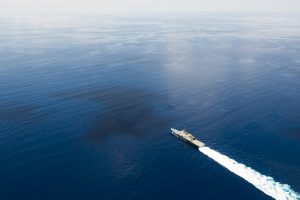Australians woke to the news last Friday that the United States would be sending long-range B-1 strike bomber aircraft to the southern hemisphere country to help deter China’s intentions in the South China Sea. As the Middle East and its people face escalating wars and civil strife, as the world stares down terrorism from Islamic State, and as the world struggles with escalating human trafficking, there was disbelief in Australia. It appeared, on the surface at least, that someone in the Pentagon had his or her priorities wrong.
The story was scotched later in the day, when the Australian prime minister, Tony Abbott, said there was no plan for B-1 deployments to the country. The Pentagon recanted and said that the senior official who had made the statement to the Senate Foreign Relations Committee on the Wednesday had “misspoken.”
Though the particular news story proved to be inaccurate, there has been rising angst in the United States and its Asia-Pacific allies, like Australia, about China’s maritime ambitions and its military activities, especially in the South China Sea. However, this anxiety is, as we say in the Queen’s English, “over-egged” (exaggerated) and to some degree self-induced.
The alarmist news Friday followed otherwise fairly balanced testimony in the Senate Foreign Relations Committee by the senior official from the Pentagon. But there is one point in his submitted testimony on which the United States needs to be much clearer and could probably exercise some greater restraint. This is the balance between increasing robust in-theater military operations and diplomacy.
The U.S. diplomacy has been very successful, and is striking most of the right notes consistently. By contrast, the military edginess that the Pentagon has been consistently displaying over the South China Sea appears to be overkill.
In his testimony, David Shear, the assistant secretary of defense for Asian and Pacific security affairs, referred to one policy that should give Australians pause for thought. This is the idea of “trilateralizing” military alliances. The case he mentioned is the Japan-Australia-U.S. military partnership. Japan and Australia do not have a mutual defense treaty, but each has one with the United States. Shear said: “To expand the reach of these alliances, we are embarking on unprecedented ‘trilateral’ cooperation – in other words we are networking our relationships.” He said that the United States is cooperating “trilaterally with Japan and Australia to strengthen maritime security in Southeast Asia.”
This is not news for Australia, and all three governments have been quite open about it in broad terms. Yet the reference in the Shear testimony to its operational impacts linking U.S. marines based in Japan to those in Australia, and the follow-up reporting by another Pentagon spokesman about the supposed B-1 deployments linking them to the South China Sea, may reveal a contingency planning aspect that has not been fully exposed in Australia. Should Australia support U.S. military operations out of its territory in the case of military clash in the South China Sea or East China Sea?
Or was the talk of the B-1 deployment about something else in the background? I think it may be about the next Taiwan elections for President and the parliament due in January 2016. The ruling KMT Party that has presided over unprecedented warming of relations with Beijing suffered a landslide defeat in local elections in November 2014. The main opposition party, the DPP, is holding officially to its policy of maintaining the status quo, but its instincts are not as sympathetic toward Beijing as those of the KMT. If a new DPP administration in Taiwan were to create a crisis, that would be worthy of contingency planning that may involve B-1 deployments to Australia. The South China Sea situation is not remotely close to that point.

































